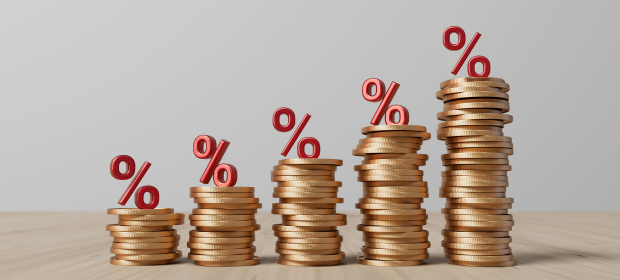There’s no arguing that the cost-of-living crisis has a lot to answer for, and it’s even having a knock on consequence on interest rates too. That’s because in order to try and reduce inflation rates the Bank of England recently raised the interest base rate to 5% (up from 4.5%).

This is important because HMRC uses the Bank of England’s base rate to calculate its interest rates, and so any increase will affect the interest rates set by HMRC. In this blog post we’re focusing primarily on the increased interest rate for late tax payments – something that’s especially important to keep in mind for those needing to complete a Self Assessment!
What has the interest rate for late payments increased to?
The interest rate for late payments is calculated at the Bank of England’s base rate plus 2.5%, which means that the rate has now increased from 7% to 7.5%. This came into effect on the 11th July 2023.
The late payment interest rate has increased significantly over the last few months. In fact, back in early 2022 it was just 2.75%. For context, this means that if, for example, you had a tax bill of £1,500 that was overdue by 20 days, you’d now be charged interest of £6.16 compared to January last year when you’d have been charged £2.26. Whilst this might not sound like much, it’s important to remember that interest is charged on the full amount of tax that you owe (including unpaid penalties that begin to accrue if your payment is over 30 days late) so it’s very easy for charges to quickly stack up and get out of hand.
What about other interest rates?
In addition to the interest rate for late tax payments, HMRC has also increased the interest rate for any late quarterly instalment payments. For Corporation Tax this is calculated at the base rate plus 1%, meaning that it’s now increased from 5.5% to 6%. In addition, the repayment interest is set at the base rate minus 1%, therefore increasing the interest rate from 3.5% to 4%. You can find out more about increased interest rates via the government website.
The moral of the story
Although it’s definitely easier said than done – especially in the current economic climate – paying your tax bill on time is the best way you can avoid being caught up in any late payment charges. If you’re concerned that you won’t be able to pay your tax bill on time, we strongly recommend that you get in touch with HMRC as soon as possible, preferably ahead of the deadline, as they’ll be able to best advise you and/or you may be able to set up a payment plan.
If you’d like advice about how you can potentially reduce your overall tax exposure, request a free consultation with Warr & Co and a member of our experienced accountancy team will be in touch, or take a look at our Self Assessment service.

 © 2019 Warr & Co Chartered Accountants. Warr & Co Chartered Accountants is a member of The Institute of Chartered Accountants in England & Wales (ICAEW). Whilst the information detailed here is updated regularly to ensure it remains factually correct, it does not in any way constitute specific advice and no responsibility shall be accepted for any actions taken directly as a consequence of reading it. If you would like to discuss any of the points raised and / or engage our services in providing advice specific to your personal circumstances, please feel free to contact any one of the partners on 0161 477 6789 or contact us via our website forms. Warr & Co Chartered Accountants are registered to carry our audit work in the UK, our audit registration number is C002961684, for more information please visit www.auditregister.org.uk.
© 2019 Warr & Co Chartered Accountants. Warr & Co Chartered Accountants is a member of The Institute of Chartered Accountants in England & Wales (ICAEW). Whilst the information detailed here is updated regularly to ensure it remains factually correct, it does not in any way constitute specific advice and no responsibility shall be accepted for any actions taken directly as a consequence of reading it. If you would like to discuss any of the points raised and / or engage our services in providing advice specific to your personal circumstances, please feel free to contact any one of the partners on 0161 477 6789 or contact us via our website forms. Warr & Co Chartered Accountants are registered to carry our audit work in the UK, our audit registration number is C002961684, for more information please visit www.auditregister.org.uk.